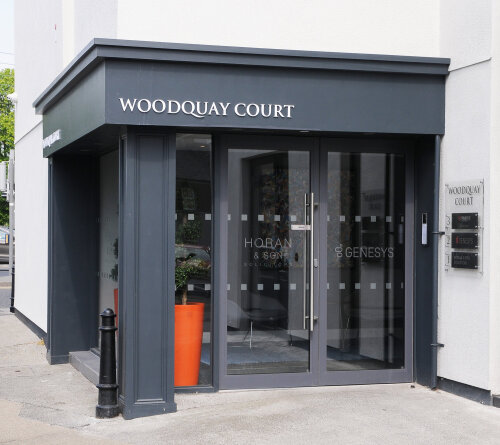Best Toxic Mold Lawyers in Galway
Share your needs with us, get contacted by law firms.
Free. Takes 2 min.
List of the best lawyers in Galway, Ireland
About Toxic Mold Law in Galway, Ireland
Toxic mold is a significant concern for many residents and property owners in Galway, Ireland, due to the region's damp climate, which is conducive to mold growth. Toxic molds, such as Stachybotrys chartarum, can cause health issues and property damage if not addressed promptly. In Ireland, the responsibility for mold remediation and the potential legal repercussions for failing to manage mold varies depending on the circumstances and the relationships between the involved parties, such as tenants, landlords, and property developers.
Why You May Need a Lawyer
Legal assistance may be necessary in several scenarios involving toxic mold in Galway. Common situations include disputes between tenants and landlords over mold-related issues, property sales where mold was undisclosed, or health-related claims resulting from mold exposure. A lawyer can help navigate these complex issues, ensure compliance with relevant laws, and provide representation in negotiations or court proceedings.
Local Laws Overview
In Ireland, there are no specific laws targeting toxic mold; however, several regulations and standards may apply indirectly. The Housing (Standards for Rented Houses) Regulations 2019 outlines landlords' responsibilities to maintain their properties in a condition that is safe and free from serious disrepair, which includes addressing dampness or mold issues. Under the Residential Tenancies Act 2004, tenants can report property conditions to the Residential Tenancies Board (RTB). For workspaces, the Safety, Health, and Welfare at Work Act 2005 mandates employers to ensure a safe working environment, potentially implicating mold issues.
Frequently Asked Questions
What health problems can toxic mold cause?
Toxic mold can cause a variety of health problems, including respiratory issues, allergic reactions, and skin irritation. In sensitive individuals, symptoms can be more severe, such as asthma attacks or fungal infections.
Who is responsible for mold remediation: the tenant or the landlord?
Typically, landlords are responsible for maintaining the property in a safe and habitable condition, which includes addressing mold issues. Tenants, however, are generally expected to report problems promptly and to ventilate and clean areas susceptible to mold growth.
What evidence is needed for a mold claim?
Evidence might include medical records indicating health issues caused by mold, photographs of the moldy area, communications between parties (e.g., emails, letters), and testimony from health and safety experts.
Can a tenant break a lease due to mold?
A tenant might be able to break a lease if the landlord fails to address serious mold problems, rendering the property uninhabitable. It's advisable to seek legal advice and document all communications and conditions thoroughly before proceeding.
Is it necessary to have an expert inspect the property for mold?
In many cases, having a professional inspection can provide crucial evidence of mold presence and extent. An expert can also recommend appropriate remediation steps and help support any legal claims.
What is the role of the Residential Tenancies Board regarding mold issues?
The RTB can mediate disputes between tenants and landlords, provide guidance on rights and responsibilities, and adjudicate cases if necessary. It is a resource for both parties in managing rental property disputes.
How can I prove that my health issues are due to mold exposure?
Medical documentation and diagnostic tests indicating health issues consistent with mold exposure are essential. Additionally, environmental testing and expert testimony may help establish a causal link.
What steps should a landlord take if they find mold in a rental property?
Landlords should promptly remediate the mold, investigate and fix any underlying issues causing dampness or leaks, and ensure the property's compliance with health and safety standards.
What are my options if my landlord ignores mold issues?
If a landlord ignores mold problems, tenants can contact the RTB to file a complaint, keep detailed records of the issue, and potentially engage a lawyer to explore further legal actions.
Can toxic mold affect the sale of a property?
Yes, undisclosed mold can affect a property's sale, potentially leading to legal disputes. Sellers should address any mold issues and potential buyers should conduct thorough inspections to avoid future complications.
Additional Resources
For further assistance, individuals can consult the following resources: - The Residential Tenancies Board (RTB) for tenant-landlord disputes. - Galway City Council for local housing issues and regulations. - The Health and Safety Authority (HSA) for workplace-related mold concerns. - Citizens Information for advice on landlord and tenant rights.
Next Steps
If you suspect or encounter toxic mold issues and require legal assistance, it is recommended to: 1. Document all evidence related to the mold issue, including photos, communication, and medical records. 2. Seek an expert’s assessment and report on the mold presence and its effects. 3. Contact relevant authorities, such as the RTB, for guidance or official support. 4. Consult with a local lawyer specializing in property law or environmental issues for tailored legal advice. 5. Consider mediation services to resolve disputes amicably before pursuing formal legal action.
Lawzana helps you find the best lawyers and law firms in Galway through a curated and pre-screened list of qualified legal professionals. Our platform offers rankings and detailed profiles of attorneys and law firms, allowing you to compare based on practice areas, including Toxic Mold, experience, and client feedback.
Each profile includes a description of the firm's areas of practice, client reviews, team members and partners, year of establishment, spoken languages, office locations, contact information, social media presence, and any published articles or resources. Most firms on our platform speak English and are experienced in both local and international legal matters.
Get a quote from top-rated law firms in Galway, Ireland — quickly, securely, and without unnecessary hassle.
Disclaimer:
The information provided on this page is for general informational purposes only and does not constitute legal advice. While we strive to ensure the accuracy and relevance of the content, legal information may change over time, and interpretations of the law can vary. You should always consult with a qualified legal professional for advice specific to your situation.
We disclaim all liability for actions taken or not taken based on the content of this page. If you believe any information is incorrect or outdated, please contact us, and we will review and update it where appropriate.















